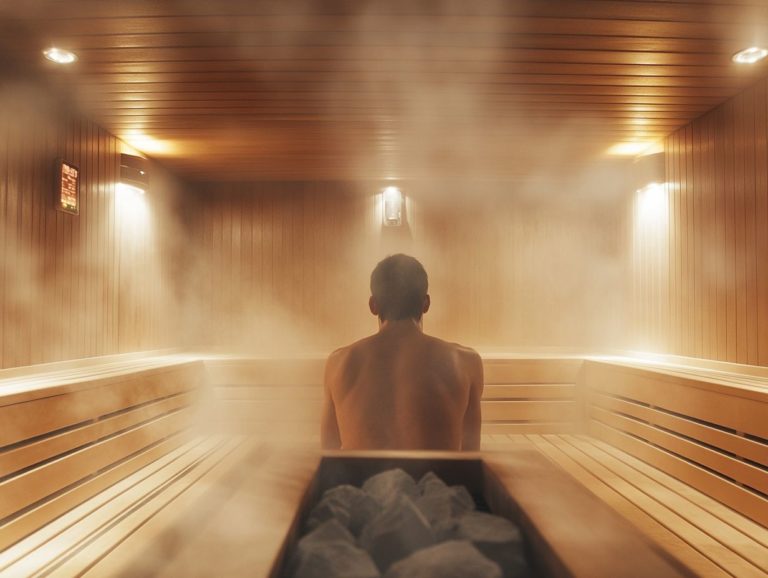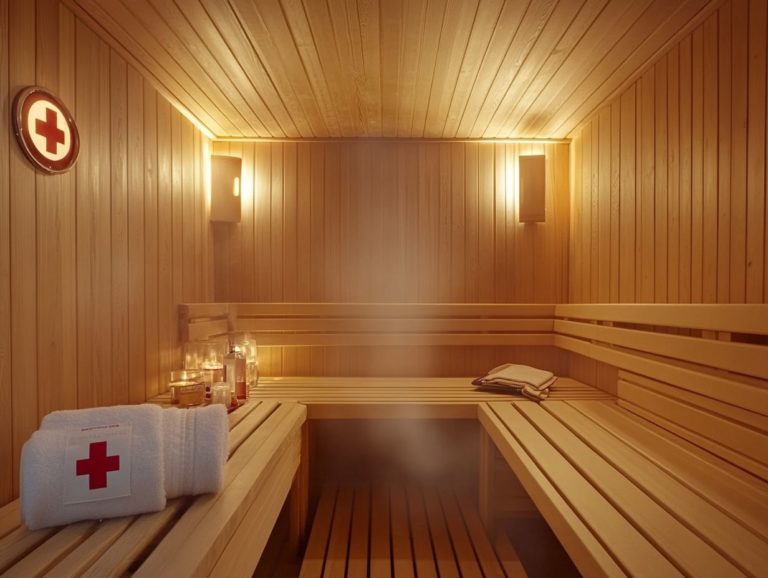Recognizing Allergies and Saunas: Safety Tips
Allergies can pose quite a challenge, affecting your daily life and overall well-being. Understanding common allergens and their symptoms is your first step in effectively managing these sensitivities, especially for individuals with conditions such as asthma and allergic rhinitis.
For those who relish the experience of saunas, particularly traditional saunas and infrared saunas, it’s important to know how to stay safe while enjoying many benefits. This article delves into essential safety tips, highlighting how saunas can help alleviate allergy symptoms and presents alternatives for individuals with severe reactions, including infrared sauna therapy, which is beneficial for respiratory health.
It also covers how to maintain a clean sauna to ensure your relaxation space remains free from allergens, which is critical for those with respiratory health issues. Discover how you can enjoy a healthier way to enhance your sauna experience and improve your overall well-being.
Contents
- Key Takeaways:
- Understanding Allergies
- Common Allergens and Symptoms
- Sauna Safety for Allergy Sufferers
- Benefits of Saunas for Allergies
- Alternatives to Traditional Saunas
- Options for Those with Severe Allergies
- Sauna Maintenance and Allergen Control
- Frequently Asked Questions
- What are common signs of an allergic reaction in a sauna, particularly in relation to heat and humidity exposure?
- Can saunas trigger an allergic reaction?
- How can you stay safe from allergies while enjoying your sauna?
- Are there specific types of allergies that are triggered by saunas and sauna bathing?
- What should I do if I notice someone having an allergic reaction in a sauna?
- Can saunas be beneficial for those with allergies?
Key Takeaways:
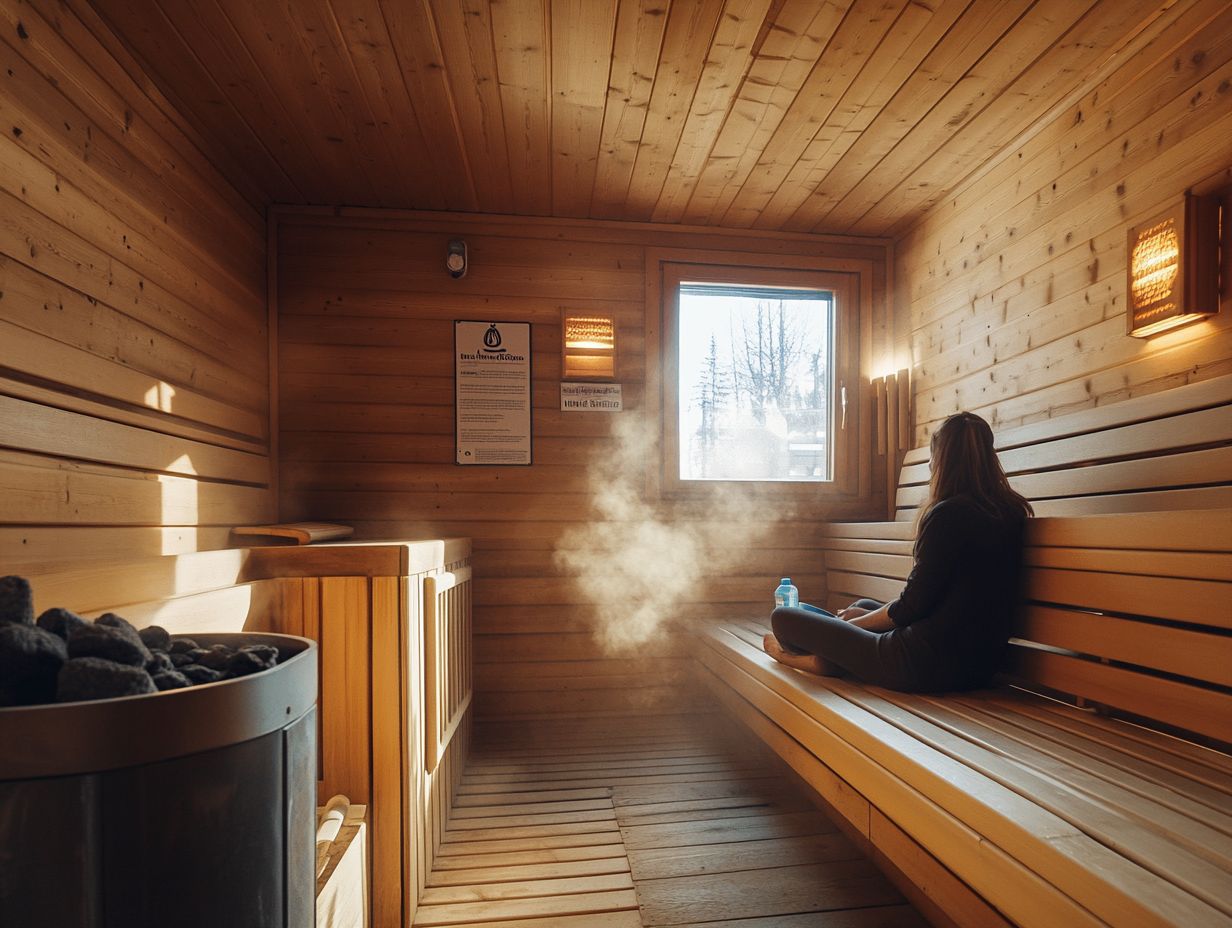
- Recognize common allergens and their symptoms to manage allergies.
- Follow safety tips when using saunas to reduce risks.
- Consider alternatives for severe allergies, like infrared saunas.
Understanding Allergies
Grasping the intricacies of allergies is essential for effectively managing symptoms and enhancing overall health, especially in relation to conditions that affect brain function, such as Alzheimer s Disease. Allergies arise from the immune system’s heightened sensitivity to specific substances, known as allergens, resulting in a range of reactions that can lead to considerable discomfort.
You may encounter common allergens like pollen, dust mites, molds, and particular foods, which can provoke responses such as allergic rhinitis, asthma, and various respiratory complications, leading to conditions like chronic bronchitis and pneumonia.
For many individuals, these reactions can further aggravate neurocognitive diseases, impacting daily life and well-being particularly among vulnerable groups like children and the elderly, who may also be at risk for cardiovascular disease.
Common Allergens and Symptoms
Common allergens encompass a variety of triggers, including dust mites, pollen, pet dander, and certain foods, each capable of leading to symptoms such as sneezing, itching, and respiratory distress, which can affect lung function and induce inflammation.
These allergens can provoke a spectrum of reactions, particularly impacting individuals with conditions like allergic rhinitis, asthma, or chronic bronchitis, which may further complicate existing pulmonary disease. Take dust mites, for example; they thrive in home environments and can instigate intense nasal congestion and watery eyes for those who are sensitive, leading to further allergic responses.
Then there’s pollen from trees and grasses, which can become a pressing concern during seasonal shifts, often worsening asthma symptoms, especially in individuals with high blood pressure. Pet dander is another culprit; it carries proteins that can lead to persistent coughing and breathing difficulties for those allergic to animals, particularly in sensitive populations such as pregnant women, children, and the elderly.
Meanwhile, certain foods, such as nuts or shellfish, can cause not only gastrointestinal discomfort but also severe respiratory complications in extreme cases, highlighting the intricate connection between common allergens and overall respiratory health, which is crucial for immune response and detoxification.
Take charge of your health today by understanding your allergies and sauna safety!
Sauna Safety for Allergy Sufferers
Sauna safety is crucial for those with allergies. Improper use can worsen symptoms and lead to dehydration or heat-related illnesses like heatstroke. It’s essential to know your health needs when considering sauna therapy, whether you choose traditional or infrared saunas. Each type offers unique health benefits.
These environments can provide significant relief through heat exposure, but they also carry risks of dehydration if precautions aren t taken. Being informed about sauna safety can enhance the therapeutic benefits, like improved cardiovascular health, while minimizing risks for everyone involved.
Precautions and Tips
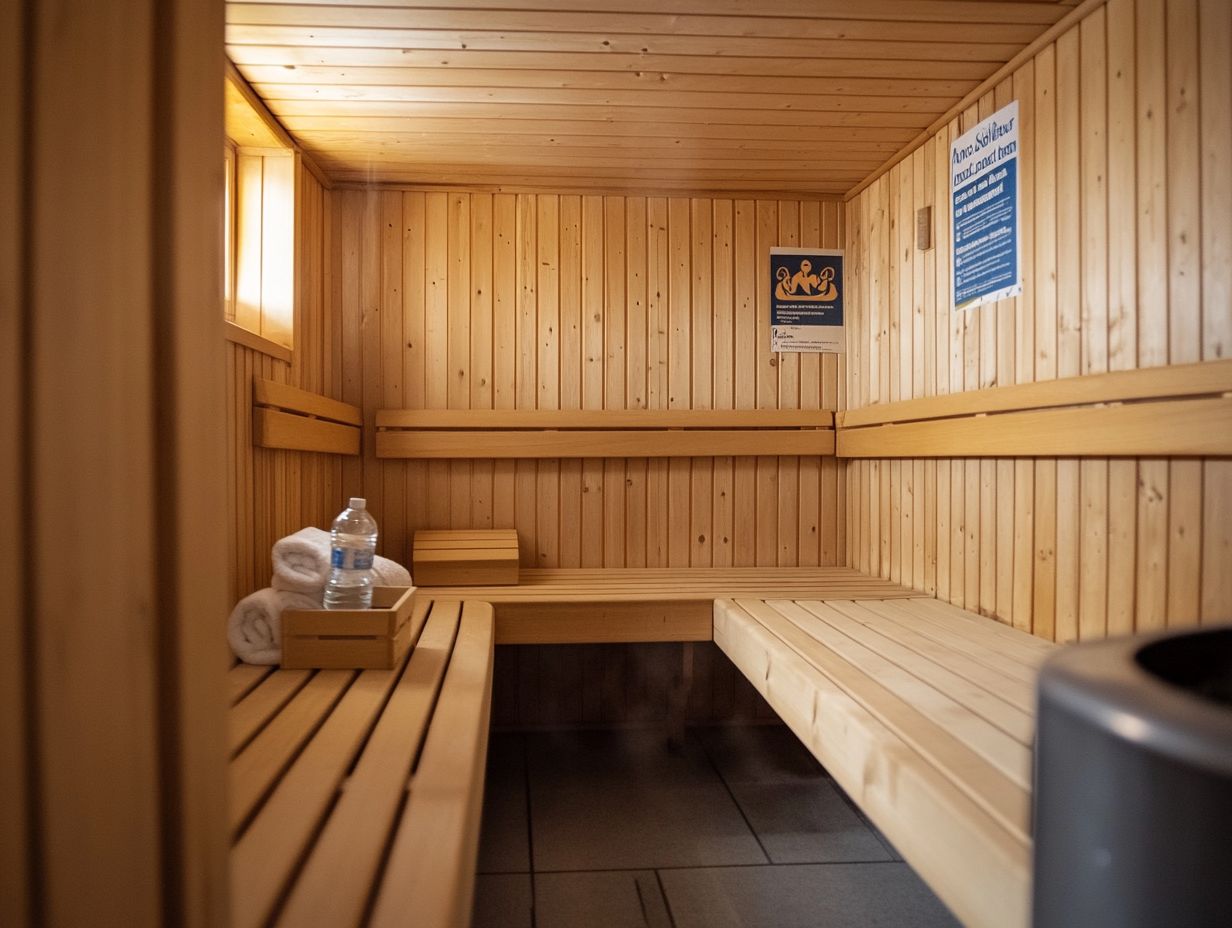
Taking precautions for sauna use is vital for allergy sufferers. This helps prevent adverse effects and ensures a safe, enjoyable experience, especially for those with chronic tension or musculoskeletal disorders.
Know your health needs to make informed decisions about sauna usage. Consider factors like hydration and heat tolerance. Staying hydrated before, during, and after your session is crucial to combat heat effects and maintain well-being.
Know your heat tolerance; excessive heat can trigger symptoms or worsen your condition, particularly for individuals with chronic bronchitis. Watch for potential allergic reactions to chemicals, fragrances, or materials in the sauna, ensuring you enjoy your visit with confidence and comfort.
Benefits of Saunas for Allergies
Saunas are great for your health, especially if you have allergies. They offer various health benefits, such as improved immune system function and reduced inflammation.
Using both traditional and infrared saunas can enhance respiratory health, easing symptoms of allergic rhinitis and asthma. They can also improve peak nasal inspiratory flow. By mimicking fever through heat therapy, saunas boost the body’s natural immune response, including T-Cells, while creating a soothing atmosphere that helps relieve chronic tension.
This positions sauna therapy as a valuable complementary treatment for allergy sufferers seeking relief, especially when combined with allergy medications.
How Saunas Can Help with Allergy Symptoms
Saunas can be a remarkable ally in reducing your allergy symptoms. They enhance your respiratory health through heat therapy, boosting your immune response and supporting lung function.
This practice invites relaxation and promotes dilation of blood vessels. This leads to improved oxygenation of your tissues and effectively flushes toxins from your body, including heavy metals. Traditional saunas create a high-heat, humid environment, ideal for loosening mucus in your airways, making it easier to expel allergens and irritants.
Infrared saunas penetrate deeper into your skin. They stimulate circulation and encourage a gentle sweating response, aiding in detoxification and enhancing the benefits of sauna bathing. Both types also boost the production of nasal secretions, helping clear allergens and supporting your overall respiratory function, especially beneficial for asthma sufferers.
Alternatives to Traditional Saunas
If you have severe allergies, consider alternatives like infrared saunas. They can offer effective relief without worsening symptoms. Infrared saunas use lower temperature settings and penetrate heat deeply, making them especially beneficial for those sensitive to the higher heat of traditional saunas.
These alternatives can mitigate allergic reactions and foster relaxation while enhancing circulation. They are a compelling choice for anyone seeking safer sauna therapy options and improved lung function.
Options for Those with Severe Allergies

Options for those with severe allergies often include infrared saunas, which may offer relief while minimizing allergic reactions. Steam rooms can similarly support better respiratory function.
These innovative solutions leverage heat exposure to enhance circulation and remove toxins, potentially easing symptoms triggered by allergens and improving cardiovascular health. You might also consider alternatives like steam rooms and traditional saunas, which promote processes beneficial for lung function.
Air purifiers can be a game-changer, helping to eliminate airborne allergens. Additionally, allergy medications can assist in managing your reactions to allergens during sauna therapy. By combining these strategies, including sauna therapy, you can take charge of your health and lead a more comfortable life.
Sauna Maintenance and Allergen Control
Ensuring proper sauna maintenance and allergen control is essential for safeguarding users, particularly those with allergies, from harmful chemicals and allergens. Regular cleaning and upkeep of the sauna environment can greatly diminish the presence of dust, mold, and other allergens that might provoke respiratory issues.
Keeping both traditional and infrared saunas clean creates a safe, healthy space for relaxation and heat therapy, crucial for those suffering from chronic bronchitis or asthma. By prioritizing sauna maintenance, you can fully embrace the benefits of sauna bathing without jeopardizing your health or risking dehydration.
Keeping Saunas Clean and Allergen-Free
Maintaining a clean and allergen-free sauna is crucial for your respiratory health, especially if you suffer from allergies or have pre-existing conditions like hypertension.
Regular maintenance isn’t just a good idea; it’s essential for creating a safe and soothing environment, particularly for allergy sufferers. You can achieve this with a few straightforward practices to ensure optimal respiratory health:
- Routinely wipe down surfaces using mild, non-toxic cleaners, avoiding any chemical substances that may provoke allergic reactions.
- Ensure proper ventilation throughout the space to reduce humidity levels that can cause mold growth.
- Frequently replace the water in steam saunas to prevent mold growth and maintain the overall purity of the sauna environment.
It’s important to monitor humidity levels, as excessive moisture can lead to allergen buildup and respiratory complications. Using a dedicated vacuum equipped with HEPA filters can effectively trap dust and pollen, reducing respiratory irritants that could trigger allergic responses.
By implementing these consistent maintenance methods, you can relax with the peace of mind that you’re enjoying a clean and allergen-free sauna experience, supporting your overall health. Start today to enjoy a refreshing and allergen-free sauna experience!
Frequently Asked Questions
What are common signs of an allergic reaction in a sauna, particularly in relation to heat and humidity exposure?
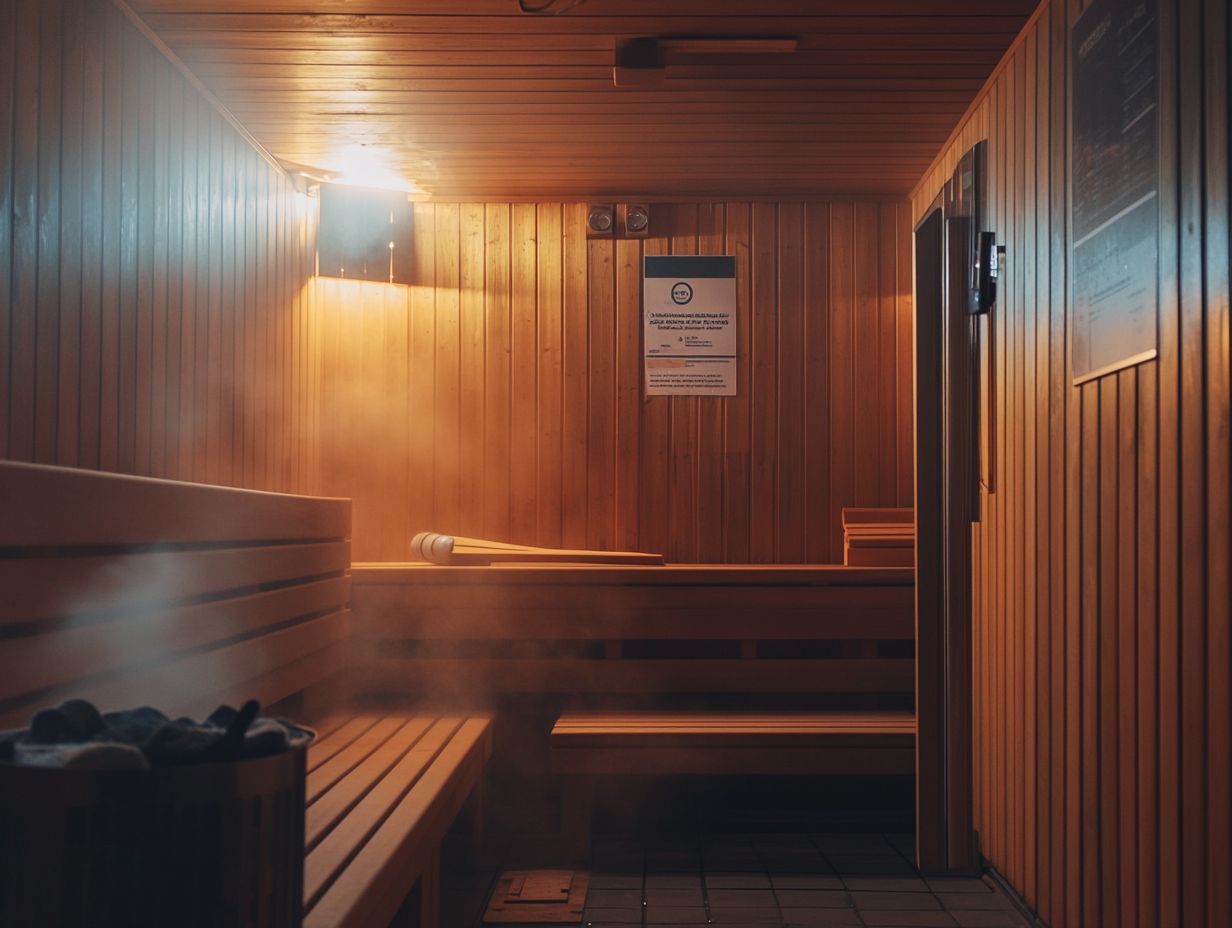
Common signs of an allergic reaction in a sauna include itching, hives, redness, and swelling on the skin. These symptoms can also be accompanied by difficulty breathing, dizziness, and nausea.
Can saunas trigger an allergic reaction?
Yes, saunas can trigger an allergic reaction in some individuals. The heat and steam in a sauna can cause the body to release histamine, resulting in an allergic reaction.
How can you stay safe from allergies while enjoying your sauna?
Some safety tips for those with allergies in saunas include avoiding scented products in the sauna, bringing an inhaler or antihistamine medication, and having a friend or family member nearby in case of a severe allergic reaction.
Are there specific types of allergies that are triggered by saunas and sauna bathing?
Any type of allergy can potentially be triggered by saunas. Common triggers include heat, mold, and fragrances.
Individuals with known allergies should be cautious in saunas. It’s essential to inform others about any allergies you have.
What should I do if I notice someone having an allergic reaction in a sauna?
If you see someone having an allergic reaction, stay calm and call for medical help right away.
If the person has allergy medication, assist them in using it. Offer support until help arrives.
Can saunas be beneficial for those with allergies?
Yes! Saunas can be beneficial for allergy sufferers. The steam can clear nasal passages and help with respiratory issues.
Consult a healthcare professional before using a sauna for any medical condition.



